6 mar 2018

by Jonathan Cook
It is has been a very bad week for those claiming Israel has the most moral army in the world. Here’s a small sample of abuses of Palestinians in recent days in which the Israeli army was caught lying.
A child horrifically injured by soldiers was arrested and terrified into signing a false confession that he was hurt in a bicycle accident. A man who, it was claimed, had died of tear-gas inhalation was actually shot at point-blank range, then savagely beaten by a mob of soldiers and left to die. And soldiers threw a tear gas canister at a Palestinian couple, baby in arms, as they fled for safety during a military invasion of their village.
In the early 2000s, at the dawn of the social media revolution, Israelis used to dismiss filmed evidence of brutality by their soldiers as fakery. It was what they called “Pallywood” – a conflation of Palestinian and Hollywood.
In truth, however, it was the Israeli military, not the Palestinians, that needed to manufacture a more convenient version of reality.
Last week, it emerged, Israeli officials had conceded to a military court that the army had beaten and locked up a group of Palestinian reporters as part of an explicit policy of stopping journalists from covering abuses by its soldiers.
Israel’s deceptions have a long history. Back in the 1970s, a young Juliano Meir-Khamis, later to become one of Israel’s most celebrated actors, was assigned the job of carrying a weapons bag on operations in the Jenin refugee camp in the West Bank. When Palestinian women or children were killed, he placed a weapon next to the body.
In one incident, when soldiers playing around with a shoulder-launcher fired a missile at a donkey, and the 12-year-old girl riding it, Meir-Khamis was ordered to put explosives on their remains.
That occurred before the Palestinians’ first mass uprising against the occupation erupted in the late 1980s. Then, the defence minister Yitzhak Rabin – later given a Hollywood-style makeover himself as a peacemaker – urged troops to “break the bones” of Palestinians to stop their liberation struggle.
The desperate, and sometimes self-sabotaging, lengths Israel takes to try to salvage its image were underscored last week when 15-year-old Mohammed Tamimi was grabbed from his bed in a night raid.
Back in December he was shot in the face by soldiers during an invasion of his village of Nabi Saleh. Doctors saved his life, but he was left with a misshapen head and a section of skull missing.
Mohammed’s suffering made headlines because he was a bit-player in a larger drama. Shortly after he was shot, a video recorded his cousin, 16-year-old Ahed Tamimi, slapping a soldier nearby after he entered her home.
Ahed, who is in jail awaiting trial, was already a Palestinian resistance icon. Now she has become a symbol too of Israel’s victimization of children.
So, Israel began work on recrafting the narrative: of Ahed as a terrorist and provocateur.
It emerged that a government minister, Michael Oren, had even set up a secret committee to try to prove that Ahed and her family were really paid actors, not Palestinians, there to “make Israel look bad”. The Pallywood delusion had gone into overdrive.
Last week events took a new turn as Mohammed and other relatives were seized, even though he is still gravely ill. Dragged off to an interrogation cell, he was denied access to a lawyer or parent.
Shortly afterwards, Israel produced a signed confession stating that Mohammed’s horrific injuries were not Israel’s responsibility but wounds inflicted in a bicycle crash.
Yoav Mordechai, the occupation’s top official, trumpeted proof of a Palestinian “culture of lies and incitement”. Mohammed’s injuries were “fake news”, the Israeli media dutifully reported.
Deprived of a justification for slapping an occupation soldier, Ahed can now be locked away by military judges. Except that witnesses, phone records and hospital documentation, including brain scans, all prove that Mohammed was shot.
This was simply another of Israellywood’s endless productions to automatically confer guilt on Palestinians. The hundreds of children on Israel’s incarceration production line each year have to sign confessions – or plea bargains – to win jail-sentence reductions from courts with near-100% conviction rates.
It is more Franz Kafka than Hollywood.
A second army narrative unraveled last week. CCTV showed Yasin Saradih, 35, being shot at point-blank range during an invasion of Jericho, then savagely beaten by soldiers as he lay wounded, and left to bleed to death.
It was an unexceptional incident. A report by Amnesty International last month noted that many of the dozens of Palestinians killed in 2017 appeared to be victims of extra-judicial executions.
Before footage of Saradih’s killing surfaced, the army issued a series of false statements, including that he died from tear-gas inhalation, received first-aid treatment and was armed with a knife. The video disproves all of that.
Over the past two years, dozens of Palestinians, including women and children, have been shot in similarly suspicious circumstances. Invariably the army concludes that they were killed while attacking soldiers with a knife – Israel even named this period of unrest a “knife intifada”.
Are soldiers today carrying a “knife bag”, just as Meir-Khamis once carried a weapons bag?
A half-century of occupation has not only corrupted generations of teenage Israeli soldiers who have been allowed to lord it over Palestinians. It has also needed an industry of lies and self-deceptions to make sure the consciences of Israelis are never clouded by a moment of doubt – that maybe their army is not so moral after all.
- Jonathan Cook won the Martha Gellhorn Special Prize for Journalism. His article is published in Palestine Chronicle.
It is has been a very bad week for those claiming Israel has the most moral army in the world. Here’s a small sample of abuses of Palestinians in recent days in which the Israeli army was caught lying.
A child horrifically injured by soldiers was arrested and terrified into signing a false confession that he was hurt in a bicycle accident. A man who, it was claimed, had died of tear-gas inhalation was actually shot at point-blank range, then savagely beaten by a mob of soldiers and left to die. And soldiers threw a tear gas canister at a Palestinian couple, baby in arms, as they fled for safety during a military invasion of their village.
In the early 2000s, at the dawn of the social media revolution, Israelis used to dismiss filmed evidence of brutality by their soldiers as fakery. It was what they called “Pallywood” – a conflation of Palestinian and Hollywood.
In truth, however, it was the Israeli military, not the Palestinians, that needed to manufacture a more convenient version of reality.
Last week, it emerged, Israeli officials had conceded to a military court that the army had beaten and locked up a group of Palestinian reporters as part of an explicit policy of stopping journalists from covering abuses by its soldiers.
Israel’s deceptions have a long history. Back in the 1970s, a young Juliano Meir-Khamis, later to become one of Israel’s most celebrated actors, was assigned the job of carrying a weapons bag on operations in the Jenin refugee camp in the West Bank. When Palestinian women or children were killed, he placed a weapon next to the body.
In one incident, when soldiers playing around with a shoulder-launcher fired a missile at a donkey, and the 12-year-old girl riding it, Meir-Khamis was ordered to put explosives on their remains.
That occurred before the Palestinians’ first mass uprising against the occupation erupted in the late 1980s. Then, the defence minister Yitzhak Rabin – later given a Hollywood-style makeover himself as a peacemaker – urged troops to “break the bones” of Palestinians to stop their liberation struggle.
The desperate, and sometimes self-sabotaging, lengths Israel takes to try to salvage its image were underscored last week when 15-year-old Mohammed Tamimi was grabbed from his bed in a night raid.
Back in December he was shot in the face by soldiers during an invasion of his village of Nabi Saleh. Doctors saved his life, but he was left with a misshapen head and a section of skull missing.
Mohammed’s suffering made headlines because he was a bit-player in a larger drama. Shortly after he was shot, a video recorded his cousin, 16-year-old Ahed Tamimi, slapping a soldier nearby after he entered her home.
Ahed, who is in jail awaiting trial, was already a Palestinian resistance icon. Now she has become a symbol too of Israel’s victimization of children.
So, Israel began work on recrafting the narrative: of Ahed as a terrorist and provocateur.
It emerged that a government minister, Michael Oren, had even set up a secret committee to try to prove that Ahed and her family were really paid actors, not Palestinians, there to “make Israel look bad”. The Pallywood delusion had gone into overdrive.
Last week events took a new turn as Mohammed and other relatives were seized, even though he is still gravely ill. Dragged off to an interrogation cell, he was denied access to a lawyer or parent.
Shortly afterwards, Israel produced a signed confession stating that Mohammed’s horrific injuries were not Israel’s responsibility but wounds inflicted in a bicycle crash.
Yoav Mordechai, the occupation’s top official, trumpeted proof of a Palestinian “culture of lies and incitement”. Mohammed’s injuries were “fake news”, the Israeli media dutifully reported.
Deprived of a justification for slapping an occupation soldier, Ahed can now be locked away by military judges. Except that witnesses, phone records and hospital documentation, including brain scans, all prove that Mohammed was shot.
This was simply another of Israellywood’s endless productions to automatically confer guilt on Palestinians. The hundreds of children on Israel’s incarceration production line each year have to sign confessions – or plea bargains – to win jail-sentence reductions from courts with near-100% conviction rates.
It is more Franz Kafka than Hollywood.
A second army narrative unraveled last week. CCTV showed Yasin Saradih, 35, being shot at point-blank range during an invasion of Jericho, then savagely beaten by soldiers as he lay wounded, and left to bleed to death.
It was an unexceptional incident. A report by Amnesty International last month noted that many of the dozens of Palestinians killed in 2017 appeared to be victims of extra-judicial executions.
Before footage of Saradih’s killing surfaced, the army issued a series of false statements, including that he died from tear-gas inhalation, received first-aid treatment and was armed with a knife. The video disproves all of that.
Over the past two years, dozens of Palestinians, including women and children, have been shot in similarly suspicious circumstances. Invariably the army concludes that they were killed while attacking soldiers with a knife – Israel even named this period of unrest a “knife intifada”.
Are soldiers today carrying a “knife bag”, just as Meir-Khamis once carried a weapons bag?
A half-century of occupation has not only corrupted generations of teenage Israeli soldiers who have been allowed to lord it over Palestinians. It has also needed an industry of lies and self-deceptions to make sure the consciences of Israelis are never clouded by a moment of doubt – that maybe their army is not so moral after all.
- Jonathan Cook won the Martha Gellhorn Special Prize for Journalism. His article is published in Palestine Chronicle.

Israeli occupation forces (IOF) leveled Palestinian agricultural lands and set up a military camp in al-Hummusa al-Foqa area in the northern Jordan valley in preparation for military drills.
The Palestinian activist Mutaz Besharat told Quds Press that the Israeli measure is a continuation of the IOF violations in the area. Some 16 Palestinian families in the Jordan Valley were evacuated on Monday by the IOF at the pretext of the upcoming military exercises, he said.
Earlier on Tuesday, Israeli settlers leveled agricultural lands near Massafer Yatta town south of al-Khalil, Besharat pointed out.
The Palestinian activist Mutaz Besharat told Quds Press that the Israeli measure is a continuation of the IOF violations in the area. Some 16 Palestinian families in the Jordan Valley were evacuated on Monday by the IOF at the pretext of the upcoming military exercises, he said.
Earlier on Tuesday, Israeli settlers leveled agricultural lands near Massafer Yatta town south of al-Khalil, Besharat pointed out.
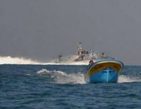
Israeli navy ships opened fire, Tuesday, at several Palestinian fishing boats, while the soldiers fired live rounds at farmers, in the southern and northern parts of the besieged Gaza Strip.
Eyewitnesses said the soldiers, stationed on military towers, east of Khan Younis, in southern Gaza, fired dozens of live rounds, east of Khan Younis, forcing the Palestinians to leave.
In addition, Israeli navy ships also fired live rounds at fishing boats, in Palestinian waters in the northern part of the Gaza Strip, forcing the fishers to return to the shore without being able to fish and provide for their families.
Eyewitnesses said the soldiers, stationed on military towers, east of Khan Younis, in southern Gaza, fired dozens of live rounds, east of Khan Younis, forcing the Palestinians to leave.
In addition, Israeli navy ships also fired live rounds at fishing boats, in Palestinian waters in the northern part of the Gaza Strip, forcing the fishers to return to the shore without being able to fish and provide for their families.
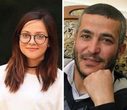
A number of Palestinians were kidnapped by the Israeli occupation forces (IOF) in abduction sweeps launched across the West Bank at predawn Tuesday.
The IOF rolled into Jenin, in the northern occupied West Bank, and kidnapped the 20-year-old Palestinian girl Fatima Jarrar from her family home.
Several members of the Jarrar family have been kidnapped by the occupation forces over recent months in manhunt sweeps targeting relatives of the slain anti-occupation attacker Ahmed Jarrar.
Israeli patrols further stormed Jenin’s western town of al-Sila al-Harithiya and kidnapped ex-prisoner Ibrahim al-Shalaby after they ravaged his family home.
At the same time, two Palestinian young men were kidnapped by the IOF following a round of home break-ins across Nablus province.
Fierce clashes burst out shortly after the assault, during which the Israeli military targeted Palestinian civilians with bullet fire, teargas canisters, and acoustic bombs.
Overnight, youngster Ahmed al-Jamal was kidnapped by the IOF as he passed through the Hawara checkpoint, south of Nablus.
The campaign culminated in the abduction of a number of Palestinians from Bethlehem province, in the southern occupied West Bank.
Israeli Army Abducts A University Student, And A Former Political Prisoner, Near Jenin
Israeli soldiers abducted, on Tuesday at dawn, a female university student from the northern West Bank city of Jenin, and a former political prisoner from Sielet al-Harithiyya town, west of Jenin.
The Jenin office of the Palestinian Prisoners’ Society (PPS) said dozens of soldiers, accompany by K9 units, invaded the home of Fadi Jarrar, after destroying its front door, and abducted his daughter, Fatima, 20, who studies at a university in Jenin.
It added that the soldiers detained the entire family for more than two hours, while female officers strip-searched the women in one room, and prevented the family, including the children, from sleeping.
The soldiers handcuffed and blindfolded Fatima, before transferring her to an unknown destination.
Furthermore, the soldiers invaded Sielet al-Harithiyya town, and abducted a former political prisoner, identified as Ibrahim Kamel Shalabi, 41, after searching and ransacking his home.
The IOF rolled into Jenin, in the northern occupied West Bank, and kidnapped the 20-year-old Palestinian girl Fatima Jarrar from her family home.
Several members of the Jarrar family have been kidnapped by the occupation forces over recent months in manhunt sweeps targeting relatives of the slain anti-occupation attacker Ahmed Jarrar.
Israeli patrols further stormed Jenin’s western town of al-Sila al-Harithiya and kidnapped ex-prisoner Ibrahim al-Shalaby after they ravaged his family home.
At the same time, two Palestinian young men were kidnapped by the IOF following a round of home break-ins across Nablus province.
Fierce clashes burst out shortly after the assault, during which the Israeli military targeted Palestinian civilians with bullet fire, teargas canisters, and acoustic bombs.
Overnight, youngster Ahmed al-Jamal was kidnapped by the IOF as he passed through the Hawara checkpoint, south of Nablus.
The campaign culminated in the abduction of a number of Palestinians from Bethlehem province, in the southern occupied West Bank.
Israeli Army Abducts A University Student, And A Former Political Prisoner, Near Jenin
Israeli soldiers abducted, on Tuesday at dawn, a female university student from the northern West Bank city of Jenin, and a former political prisoner from Sielet al-Harithiyya town, west of Jenin.
The Jenin office of the Palestinian Prisoners’ Society (PPS) said dozens of soldiers, accompany by K9 units, invaded the home of Fadi Jarrar, after destroying its front door, and abducted his daughter, Fatima, 20, who studies at a university in Jenin.
It added that the soldiers detained the entire family for more than two hours, while female officers strip-searched the women in one room, and prevented the family, including the children, from sleeping.
The soldiers handcuffed and blindfolded Fatima, before transferring her to an unknown destination.
Furthermore, the soldiers invaded Sielet al-Harithiyya town, and abducted a former political prisoner, identified as Ibrahim Kamel Shalabi, 41, after searching and ransacking his home.
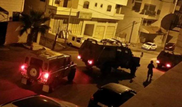
Israeli soldiers abducted, Tuesday, four Palestinians, including two siblings, in addition to damaging the contents of a shop and illegally confiscating cash, in the southern West Bank governorate of Hebron.
Media sources in Hebron said the soldiers invaded the al-Mooreq village, southwest of Hebron, searched many homes and abducted Mo’tasem Ramadan Awawda, and his brother Mahmoud.
They added that the soldiers also abducted Mohammad Nidal Jaber, from Hebron city, after assaulting him while he was heading to his work.
The soldiers also abducted Khaled Salahuddin Abu Za’rour, after invading his pluming store and ransacking it, in addition to illegally confiscating 4000 Shekels.
In relayed news, the soldiers invaded many neighborhoods in Hebron city, and installed roadblocks on roads leading to the towns of Sa’ir and Halhoul, in addition to the northern and southern roads of Hebron city, before stopping and searching dozens of cars, and interrogated many Palestinians while inspecting their ID cards.
In addition, the soldiers invaded Beit Ummar town, north of Hebron, also searched homes and summoned Ziad Ahmad al-‘Ajouri, 37, and Sami Amer Abu Jouda, 22, for interrogation in Etzion military base and security center, north of Hebron.
It is worth mentioning that the two Palestinians are former political prisoners, who were just released from Israeli detention centers two months ago.
The soldiers also fired gas bombs at the Big Mosque in Beit Ummar, causing many Palestinians to suffer the effects of teargas inhalation.
Media sources in Hebron said the soldiers invaded the al-Mooreq village, southwest of Hebron, searched many homes and abducted Mo’tasem Ramadan Awawda, and his brother Mahmoud.
They added that the soldiers also abducted Mohammad Nidal Jaber, from Hebron city, after assaulting him while he was heading to his work.
The soldiers also abducted Khaled Salahuddin Abu Za’rour, after invading his pluming store and ransacking it, in addition to illegally confiscating 4000 Shekels.
In relayed news, the soldiers invaded many neighborhoods in Hebron city, and installed roadblocks on roads leading to the towns of Sa’ir and Halhoul, in addition to the northern and southern roads of Hebron city, before stopping and searching dozens of cars, and interrogated many Palestinians while inspecting their ID cards.
In addition, the soldiers invaded Beit Ummar town, north of Hebron, also searched homes and summoned Ziad Ahmad al-‘Ajouri, 37, and Sami Amer Abu Jouda, 22, for interrogation in Etzion military base and security center, north of Hebron.
It is worth mentioning that the two Palestinians are former political prisoners, who were just released from Israeli detention centers two months ago.
The soldiers also fired gas bombs at the Big Mosque in Beit Ummar, causing many Palestinians to suffer the effects of teargas inhalation.
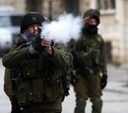
Israeli soldiers injured, Tuesday, dozens of Palestinians, mainly schoolchildren, after firing gas bombs at them near the Ibrahimi Mosque, in Hebron city, in the southern part of the occupied West Bank.
The WAFA Palestinian News Agency said the soldiers attacked dozens of Palestinians who were protested in Jroun Jarad area, and Abu ar-Reesh military roadblock at the southern entrance of the Old City and the Ibrahimi Mosque.
It added that dozens of Palestinians, especially schoolchildren suffered the effects of teargas inhalation, and received the needed treatment.
It is worth mentioning that dozens of students have to cross the military roadblock every day on their way to school and back home.
The WAFA Palestinian News Agency said the soldiers attacked dozens of Palestinians who were protested in Jroun Jarad area, and Abu ar-Reesh military roadblock at the southern entrance of the Old City and the Ibrahimi Mosque.
It added that dozens of Palestinians, especially schoolchildren suffered the effects of teargas inhalation, and received the needed treatment.
It is worth mentioning that dozens of students have to cross the military roadblock every day on their way to school and back home.
5 mar 2018
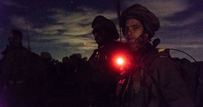
Israeli forces have been conducting military maneuvers in different locations across the West Bank and 1948 Occupied Palestine.
Israeli army started on Monday military exercises in Ariel settlement near the West Bank city of Salfit. It is slated to be halted on Tuesday whereas a new drill is going to be launched in HaKirya Camp Rabin in Tel Aviv.
The chief of Israeli army said that the military exercises are part of the annual drill schedule for 2018. He claimed that the drills aim to maintain the readiness and quality of the Israeli forces.
The maneuver coincided with the biennial “Juniper Cobra” four-day joint drills, taking place by the US and Israeli armies which are slated to last from Sunday to Wednesday across territories occupied in 1948.
Israeli army started on Monday military exercises in Ariel settlement near the West Bank city of Salfit. It is slated to be halted on Tuesday whereas a new drill is going to be launched in HaKirya Camp Rabin in Tel Aviv.
The chief of Israeli army said that the military exercises are part of the annual drill schedule for 2018. He claimed that the drills aim to maintain the readiness and quality of the Israeli forces.
The maneuver coincided with the biennial “Juniper Cobra” four-day joint drills, taking place by the US and Israeli armies which are slated to last from Sunday to Wednesday across territories occupied in 1948.
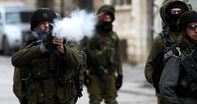
The Palestinian primary school of Anata in Occupied Jerusalem came under teargas fire from Israeli police forces on Monday afternoon, local sources reported.
Deputy Director of the school Imad Alyan affirmed that Israeli forces fired teargas bombs at the school without any prior notice.
All of the school students choked on teargas and received field treatment, he added.
Neighboring schools were also affected by the teargas attack.
Deputy Director of the school Imad Alyan affirmed that Israeli forces fired teargas bombs at the school without any prior notice.
All of the school students choked on teargas and received field treatment, he added.
Neighboring schools were also affected by the teargas attack.
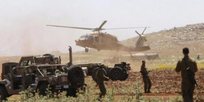
Israeli occupation authorities, on Monday morning, have notified 16 Palestinian families that they will be evicted from their homes in Khirbat Ibiziq village, east of Tubas, under the pretext that the Israeli army will conduct military drills in the area.
According to the official over the Jordan Valley file in Tubas governorate, Mu’taz Bisharat, Israeli occupation authorities notified about 80 people to evacuate their homes from 7 am to 6 pm, on Monday morning, and will continue until Wednesday morning.
Residents of the area, located in the northern Jordan Valley, east of occupied Jerusalem, are continually threatened with displacement as occupation authorities attempt to Judaize the valley.
According to the PNN, Khirbet Ibizig is comprised of Bedouins seeking water and pasture. The number of Bedouins living in the village is more than 256, including 16 families living in the area permanently, with the rest in a mobile state.
The village is subjected to continuous raids by Israeli occupation forces. Every time a raid is carried out, there are new demolition notices, threats of displacement.
Last week, Israeli forces ordered 10 families living in the area of Khirbat Ibiziq to vacate their homes for varying periods, under the pretext of conducting military exercises in the area.
According to the official over the Jordan Valley file in Tubas governorate, Mu’taz Bisharat, Israeli occupation authorities notified about 80 people to evacuate their homes from 7 am to 6 pm, on Monday morning, and will continue until Wednesday morning.
Residents of the area, located in the northern Jordan Valley, east of occupied Jerusalem, are continually threatened with displacement as occupation authorities attempt to Judaize the valley.
According to the PNN, Khirbet Ibizig is comprised of Bedouins seeking water and pasture. The number of Bedouins living in the village is more than 256, including 16 families living in the area permanently, with the rest in a mobile state.
The village is subjected to continuous raids by Israeli occupation forces. Every time a raid is carried out, there are new demolition notices, threats of displacement.
Last week, Israeli forces ordered 10 families living in the area of Khirbat Ibiziq to vacate their homes for varying periods, under the pretext of conducting military exercises in the area.
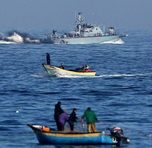
Israeli navy ships fired, on Monday morning, many live rounds at Palestinian fishing boats, in Gaza territorial waters.
Media sources in Gaza said the attacks took place near Gaza city, and in the northern part of the besieged coastal region.
They added that the fishing boats had to sail back to shore in fear of further Israeli escalation.
In related news, Israel is still holding the corpse of Ismael Salah Abu Ryala, 18, who was killed by Israeli navy fire in northern Gaza, on February 25th.
The navy fire also injured fishermen, identified as Mahmoud Adel Aby Ryala, 18, and ‘Aahed Hasan Abu Ali, 26, who were both abducted by the navy.
Media sources in Gaza said the attacks took place near Gaza city, and in the northern part of the besieged coastal region.
They added that the fishing boats had to sail back to shore in fear of further Israeli escalation.
In related news, Israel is still holding the corpse of Ismael Salah Abu Ryala, 18, who was killed by Israeli navy fire in northern Gaza, on February 25th.
The navy fire also injured fishermen, identified as Mahmoud Adel Aby Ryala, 18, and ‘Aahed Hasan Abu Ali, 26, who were both abducted by the navy.
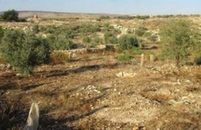
Israeli soldiers prevented, on Monday morning, many Palestinian farmers from Jayyous town, northeast of the northern West Bank city of Qalqilia, from entering their farmlands and orchards, isolated behind the Annexation Wall.
The soldiers stationed at the gate of the Annexation Wall, prevented hundreds of farmers from entering their lands, behind the Annexation Wall, west of the town.
The soldiers, stationed at Gate #935, refused to allow the farmers through, and did not provide any explanation for this act, while the farmers were trying to tend to their lands, their main source of livelihood.
The soldiers stationed at the gate of the Annexation Wall, prevented hundreds of farmers from entering their lands, behind the Annexation Wall, west of the town.
The soldiers, stationed at Gate #935, refused to allow the farmers through, and did not provide any explanation for this act, while the farmers were trying to tend to their lands, their main source of livelihood.
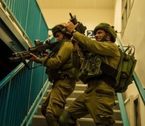
Updated: The Palestinian Prisoners Society (PPS) has reported that Israeli soldiers abducted, overnight and at dawn Monday, twelve Palestinians, after the soldiers invaded and violently searched dozens of homes across the occupied West Bank.
The PPS said the soldiers interrogated many Palestinians, while inspecting their ID cards and searching their homes, before abducting twelve.
It identified the abducted Palestinians as:
Furthermore, the soldiers invaded Khirbit Homsa village, in the West Bank’s Northern Plains, and abducted Ahmad Yousef Abu Awwad, 26, after assaulting him, causing various cuts and bruises.
On Sunday at night, the soldiers invaded Khirbit Ibzeeq area, east of Tubas in northeastern West Bank, and handed orders to sixteen Bedouin families, (around 80 persons, including children), instructing them to leave their homes on Monday, from 7 in the morning until six in the evening, so that the army can conduct live fire training.
Updated From:
Israeli Soldiers Abduct Nine Palestinians In The West Bank
Published on: Mar 5, 2018 @ 08:33
The Palestinian Prisoners Society (PPS) has reported that Israeli soldiers abducted, on Monday at dawn, eight Palestinians from their homes, in several parts of the occupied West Bank.
The Jenin office of the PPS, in northern West Bank, said dozens of soldiers invaded Qabatia town, south of the city, and violently searched them, before abducting two young men.
It identified the abducted Palestinians as Mohammad Wael Zakarna and Samer Ala Zakarna.
The soldiers also fired gas bombs and concussion grenades at many youngsters, who protesters and hurled stones at the invading army jeeps.
In addition, the soldiers invaded and searched several homes in the Old City of Nablus, in northern West Bank, and abducted Nasser Halawa and Adham Khashana.
The Ramallah office of the PPS, in central West Bank, said several army jeeps invaded Beit Rima town, northwest of the city, searched homes and abducted a former political prisoner, identified as Nidal Thalji Rimawi, 29.
The soldiers also fired gas bombs, concussion grenades and rubber-coated steel bullets at local protesters, and closed roads leading to nearby villages for several hours.
In related news, the soldiers invaded Doura town, southwest of the southern West Bank city of Hebron, and abducted Ahmad al-Masri and Mousa Ribhi al-Hroub, from their homes.
The army also invaded the nearby towns of Ethna and Yatta, and installed roadblocks on roads leading to Sa’ir and Halhoul towns, in addition to the southern entrance of Hebron city, before stopping and searching dozens of cars, and interrogated many Palestinians while inspecting their ID cards.
In occupied Jerusalem, the soldiers invaded Silwan town, south of the Al-Aqsa Mosque, and abducted a young man, identified as Mohammad Mousa Odeh.
It is worth mentioning that Odeh is a former political prisoner, who was frequently abducted and imprisoned by Israel, along with other family members.
IOF arrests 12 Palestinians, confiscates money in West Bank
The Israeli occupation forces (IOF) at dawn Monday arrested 12 Palestinian citizens and seized a large amount of money during raids launched in the West Bank.
Eyewitnesses told the PIC reporter that the IOF soldiers stormed Nablus in large numbers, raided a number of houses in the Old City and arrested the ex-prisoners Adham Khashana and Naser Halawa.
The IOF further broke into some shops in the Old City, wreaked havoc on them and left their doors open.
Clashes broke out between Palestinian youths and the IOF soldiers in different areas in Nablus during which the soldiers attacked the youths with sound bombs and tear gas canisters.
A 16-year-old boy identified as Mohammed Ramadan was arrested during a raid into Tal town west of Nablus.
Local sources told the PIC reporter that the IOF raided Qabatia town south of Jenin and arrested Sameh and Wael Zakarneh.
Several suffocation cases were reported in the town in clashes between the Palestinian citizens and the IOF who heavily fired sound bombs and tear gas canisters.
Meanwhile in al-Khalil, the IOF broke into the houses of Mousa al-Horoub and Ahmad al-Masri in Dura town and arrested them.
The IOF also arrested Mousa Abu Mefreh from Tuqu' town in Bethlehem and Nedal al-Rimawi from Beit Rima town in Ramallah.
The Israeli army announced the confiscation of thousands of shekels in search campaigns launched against homes of Palestinian citizens in different West Bank provinces.
The PPS said the soldiers interrogated many Palestinians, while inspecting their ID cards and searching their homes, before abducting twelve.
It identified the abducted Palestinians as:
- Mohammad Wael Zakarna, Qabatia – Jenin.
- Samah Ala’ Zakarna, Qabatia – Jenin.
- Mahmoud Mohannad Ya’acba, Kafr Ra’ey – Jenin.
- Ala’ Nabil Abu Dayya, Hebron.
- Mousa Ribhi al-Hroub, Hebron.
- Ahmad al-Masri, Hebron.
- Nasser Halawa, Nablus.
- Adham Khashana, Nablus.
- Nidal Thalji Ya’coub, 20, Beit Rima – Ramallah.
- Sho’eib Mustafa Zahran, Deir Abu Mashal – Ramallah.
- Mohammad Mousa Abu Mfarreh, Teqoua’ – Bethlehem.
- Mohammad Mousa Odah, Silwan – Jerusalem.
Furthermore, the soldiers invaded Khirbit Homsa village, in the West Bank’s Northern Plains, and abducted Ahmad Yousef Abu Awwad, 26, after assaulting him, causing various cuts and bruises.
On Sunday at night, the soldiers invaded Khirbit Ibzeeq area, east of Tubas in northeastern West Bank, and handed orders to sixteen Bedouin families, (around 80 persons, including children), instructing them to leave their homes on Monday, from 7 in the morning until six in the evening, so that the army can conduct live fire training.
Updated From:
Israeli Soldiers Abduct Nine Palestinians In The West Bank
Published on: Mar 5, 2018 @ 08:33
The Palestinian Prisoners Society (PPS) has reported that Israeli soldiers abducted, on Monday at dawn, eight Palestinians from their homes, in several parts of the occupied West Bank.
The Jenin office of the PPS, in northern West Bank, said dozens of soldiers invaded Qabatia town, south of the city, and violently searched them, before abducting two young men.
It identified the abducted Palestinians as Mohammad Wael Zakarna and Samer Ala Zakarna.
The soldiers also fired gas bombs and concussion grenades at many youngsters, who protesters and hurled stones at the invading army jeeps.
In addition, the soldiers invaded and searched several homes in the Old City of Nablus, in northern West Bank, and abducted Nasser Halawa and Adham Khashana.
The Ramallah office of the PPS, in central West Bank, said several army jeeps invaded Beit Rima town, northwest of the city, searched homes and abducted a former political prisoner, identified as Nidal Thalji Rimawi, 29.
The soldiers also fired gas bombs, concussion grenades and rubber-coated steel bullets at local protesters, and closed roads leading to nearby villages for several hours.
In related news, the soldiers invaded Doura town, southwest of the southern West Bank city of Hebron, and abducted Ahmad al-Masri and Mousa Ribhi al-Hroub, from their homes.
The army also invaded the nearby towns of Ethna and Yatta, and installed roadblocks on roads leading to Sa’ir and Halhoul towns, in addition to the southern entrance of Hebron city, before stopping and searching dozens of cars, and interrogated many Palestinians while inspecting their ID cards.
In occupied Jerusalem, the soldiers invaded Silwan town, south of the Al-Aqsa Mosque, and abducted a young man, identified as Mohammad Mousa Odeh.
It is worth mentioning that Odeh is a former political prisoner, who was frequently abducted and imprisoned by Israel, along with other family members.
IOF arrests 12 Palestinians, confiscates money in West Bank
The Israeli occupation forces (IOF) at dawn Monday arrested 12 Palestinian citizens and seized a large amount of money during raids launched in the West Bank.
Eyewitnesses told the PIC reporter that the IOF soldiers stormed Nablus in large numbers, raided a number of houses in the Old City and arrested the ex-prisoners Adham Khashana and Naser Halawa.
The IOF further broke into some shops in the Old City, wreaked havoc on them and left their doors open.
Clashes broke out between Palestinian youths and the IOF soldiers in different areas in Nablus during which the soldiers attacked the youths with sound bombs and tear gas canisters.
A 16-year-old boy identified as Mohammed Ramadan was arrested during a raid into Tal town west of Nablus.
Local sources told the PIC reporter that the IOF raided Qabatia town south of Jenin and arrested Sameh and Wael Zakarneh.
Several suffocation cases were reported in the town in clashes between the Palestinian citizens and the IOF who heavily fired sound bombs and tear gas canisters.
Meanwhile in al-Khalil, the IOF broke into the houses of Mousa al-Horoub and Ahmad al-Masri in Dura town and arrested them.
The IOF also arrested Mousa Abu Mefreh from Tuqu' town in Bethlehem and Nedal al-Rimawi from Beit Rima town in Ramallah.
The Israeli army announced the confiscation of thousands of shekels in search campaigns launched against homes of Palestinian citizens in different West Bank provinces.
4 mar 2018
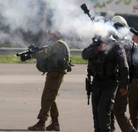
Confrontations broke out on Sunday, between Israeli forces and Palestinian students of Palestine Technical University, in the West Bank district of Hebron, with no injuries reported until the moment, said director of students’ affairs department, Issa al-Amla.
Forces reportedly fired rubber-coated steel bullets and tear gas canisters toward the students and the university’s campus; however, no injuries or arrests were reported by WAFA.
The director said that Israeli forces deliberately provoke students through their almost daily presence at the university’s entrance; and the searching and interrogating of students, which provokes violence.
Forces reportedly fired rubber-coated steel bullets and tear gas canisters toward the students and the university’s campus; however, no injuries or arrests were reported by WAFA.
The director said that Israeli forces deliberately provoke students through their almost daily presence at the university’s entrance; and the searching and interrogating of students, which provokes violence.
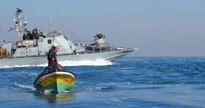
Israeli navy gunboats on Sunday evening targeted Palestinian fishermen sailing off Gaza’s seashore with heavy spates of machinegun fire.
According to local sources, Israeli warships opened fire at Palestinian fishing vessels setting sail within the six-nautical-mile zone, off al-Nusairat’s coast, in central Gaza Strip.
Israeli navy routinely opens fire on Palestinian fishermen despite sailing within the unilaterally designated six-nautical-mile fishing zone, flagrantly violating the ceasefire deal that was struck following 2014’s offensive on the Gaza enclave.
The current six-nautical-mile fishing zone falls drastically short of the twenty nautical miles allocated to Palestinian fishermen in the 1993 Oslo Accords.
According to local sources, Israeli warships opened fire at Palestinian fishing vessels setting sail within the six-nautical-mile zone, off al-Nusairat’s coast, in central Gaza Strip.
Israeli navy routinely opens fire on Palestinian fishermen despite sailing within the unilaterally designated six-nautical-mile fishing zone, flagrantly violating the ceasefire deal that was struck following 2014’s offensive on the Gaza enclave.
The current six-nautical-mile fishing zone falls drastically short of the twenty nautical miles allocated to Palestinian fishermen in the 1993 Oslo Accords.
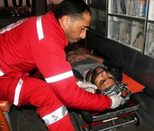
Israeli soldiers invaded, on Saturday evening, the village of Fahma, south of the northern West Bank city of Jenin, and caused many Palestinians to suffer the effects of teargas inhalation.
Media sources in Jenin said the soldiers fired a barrage gas bombs and concussion grenades at many Palestinians, who protested the invasion.
The Palestinians gathered in the center of their village, before the soldiers attacked them, pushing many to throw stones at the invading army jeeps.
Palestinian medics rushed to the village and provided the urgently needed treatment to the wounded Palestinians.
In related news, the soldiers installed a sudden military roadblock on a section of Jenin-Nablus road, near Anza village, before stopping and searching dozens of cars, and interrogated many Palestinians while inspecting their ID cards.
Media sources in Jenin said the soldiers fired a barrage gas bombs and concussion grenades at many Palestinians, who protested the invasion.
The Palestinians gathered in the center of their village, before the soldiers attacked them, pushing many to throw stones at the invading army jeeps.
Palestinian medics rushed to the village and provided the urgently needed treatment to the wounded Palestinians.
In related news, the soldiers installed a sudden military roadblock on a section of Jenin-Nablus road, near Anza village, before stopping and searching dozens of cars, and interrogated many Palestinians while inspecting their ID cards.
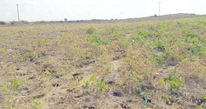
Israeli planes on Sunday sprayed toxic pesticides on Palestinian farmlands along Gaza's eastern border.
Israel regularly sprays Palestinian citizens' agricultural lands located near the border with dangerous pesticides which destroy the crops.
Farmers and eyewitnesses told the PIC reporter that Israeli planes started in the early morning hours to spray farmlands east of Gaza city with poisonous chemical substances, affirming that these pesticides have a negative effect on the crops and cause farmers to suffer huge losses.
Farmer Abu al-Said explained that the effects of Israeli pesticides appear two or three days after they are sprayed.
Israel claims that it only sprays weed killers near the border fence, but it usually sprays hundreds of dunums of land around the targeted areas killing and damaging Palestinian crops.
Israel regularly sprays Palestinian citizens' agricultural lands located near the border with dangerous pesticides which destroy the crops.
Farmers and eyewitnesses told the PIC reporter that Israeli planes started in the early morning hours to spray farmlands east of Gaza city with poisonous chemical substances, affirming that these pesticides have a negative effect on the crops and cause farmers to suffer huge losses.
Farmer Abu al-Said explained that the effects of Israeli pesticides appear two or three days after they are sprayed.
Israel claims that it only sprays weed killers near the border fence, but it usually sprays hundreds of dunums of land around the targeted areas killing and damaging Palestinian crops.

Palestinian Journalists Forum on Saturday called on the High Commissioner for Human Rights and international press institutions to open an investigation into Israeli military orders to target Palestinian journalists.
The Forum in a statement asked the Palestinian Authority and human rights organizations to file a lawsuit against those responsible at the International Criminal Court and other courts that allow the prosecution of Israeli war criminals.
Based on a report published by Haaretz newspaper on Friday, Israeli soldiers, acting on their commanders' orders, beat five Palestinian journalists with batons and arrested them during a demonstration in Kafr Qaddum village east of Qalqilya.
An Israeli soldier later admitted under questioning that orders were to arrest anyone who violated the military closure order, including journalists, and to beat anyone who resisted arrest.
On the same day when the report was published, journalist Esam al-Rimawi was injured after being deliberately hit with a tear gas canister by Israeli soldiers during his coverage of an anti-settlement demonstration in Bil'in village west of Ramallah.
Recent statistics revealed that the Israeli occupation forces committed more than 50 violations against Palestinian journalists during February 2018. Part of these attacks targeted them during their coverage of peaceful protests or confrontations in the West Bank and the eastern Gaza Strip.
The Forum in a statement asked the Palestinian Authority and human rights organizations to file a lawsuit against those responsible at the International Criminal Court and other courts that allow the prosecution of Israeli war criminals.
Based on a report published by Haaretz newspaper on Friday, Israeli soldiers, acting on their commanders' orders, beat five Palestinian journalists with batons and arrested them during a demonstration in Kafr Qaddum village east of Qalqilya.
An Israeli soldier later admitted under questioning that orders were to arrest anyone who violated the military closure order, including journalists, and to beat anyone who resisted arrest.
On the same day when the report was published, journalist Esam al-Rimawi was injured after being deliberately hit with a tear gas canister by Israeli soldiers during his coverage of an anti-settlement demonstration in Bil'in village west of Ramallah.
Recent statistics revealed that the Israeli occupation forces committed more than 50 violations against Palestinian journalists during February 2018. Part of these attacks targeted them during their coverage of peaceful protests or confrontations in the West Bank and the eastern Gaza Strip.

Violent clashes burst out on Saturday evening shortly after the Israeli occupation forces stormed Jenin’s southern town of Fahma and attacked Palestinian anti-occupation youth.
A PIC news correspondent said Israeli patrols rolled into Fahma in a flock of military vehicles before they came down heavily on Palestinian protesters.
The occupation troops showered the area with randomly-discharged spates of teargas canisters, further fueling the tension flaring up in the area.
At the same time, heavily-armed soldiers tightened military grip on the nearby Arraba town.
A PIC news correspondent said Israeli patrols rolled into Fahma in a flock of military vehicles before they came down heavily on Palestinian protesters.
The occupation troops showered the area with randomly-discharged spates of teargas canisters, further fueling the tension flaring up in the area.
At the same time, heavily-armed soldiers tightened military grip on the nearby Arraba town.
